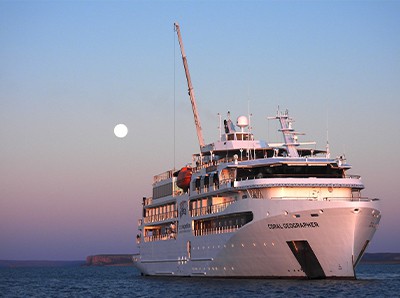CORAL Expeditions met with a number of Australian Government ministries in Canberra last week for conversations about the review and modernisation of the Coastal Trading Act 2012.
The delegation met with the ministries for Transport, Tourism, and Northern Australia, as well as a number of federal business units, with Coral reinforcing its view there needs to be recognition and protection for the country’s local cruise fleet, as there is around the world.
Commercial Director Jeff Gillies told travelBulletin Coral’s key message will be to keep the growth of the local cruise industry within the country, at a time in which Australia is enjoying unprecedented expansion, particularly in the Kimberley.
He likened the current trading environment – which allows any foreign-based and foreign-flagged line to operate in Australia – to an overseas airline flying a local domestic route.
“We’re not anti-competition, but there needs to be a fair playing field,” he insisted.
“[Foreign cruise lines] pay around about 50% less than we do in labour; they don’t pay any GST or any taxes.
“Because they’ve got such a low operating base, they can just rip the guts out of the pricing [in the Kimberley]…copy a local operator’s itinerary and sell it, and there’s no government appetite to stop it.”
Coral believes foreign cruise lines should apply for a temporary license to operate if their ship weighs less than 20,000 tonnes, while those exceeding this size would require a large vessel exemption.
They would then have to show that an Australian line cannot carry the passengers, and would also need to agree to a certain level of taxation, and to pay “fair Australian wages”.
Gillies said without reform to the Act, the local expedition cruise industry – and the country’s travel industry as a whole – will continue to lose out.
“It’s not just the Australian expedition cruise lines who have a problem, it’s small communities, regional centres around Australia,” he said.
“When you have the strongest-ever year with cruise lines, with lots of Australians giving up their hard-earned [dollars] to go out on four- and five-night trips, that’s them not taking a trip to an Australian regional destination…95% of that money has no economic benefit to Australia whatsoever.”
Gillies’ concern comes following the announcement of the closure of Horizontal Falls to tourists from 2026, largely coming behind a boat crash almost two years ago, which injured dozens of tourists.
He said Coral believes credible Australian-flagged vessels with a proven track record should be allowed to continue traversing the Falls, but that the government had little appetite to create different levels of rules.
Gillies said as the Kimberley becomes increasingly crowded, risks within destinations such as Horizontal Falls increase.
Tides in the region mean some of the Kimberley’s key natural attractions, such as the Falls and Montgomery Reef, are only visible for a few hours per day, increasing the dangers posed by congestion.
“There is a severe financial issue which is now starting to hit the Australian operators because, they’re being undercut in the marketplace,” Gillies said.
“The West Australian Government has got a decade of investment in trying to attract big ships to Western Australia, so they’re very invested in that, those big cruise lines.”







